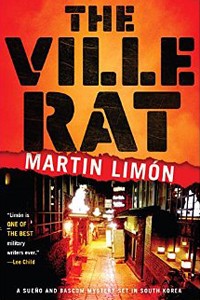This is the 10th novel in the Sergeant George Sueno series that began with Jade Lady Burning in 1998. The author Martin Limon is a US Army veteran who spent a decade in South Korea, where the series is set.
The books are narrated by Sergeant Sueno, an intelligent and sympathetic military policeman with the US 8th Army, based outside of Seoul. His curiosity and mixed race heritage mark him as somewhat of an outsider, and make him more interested in the local population and its customs than the average soldier. He is practically the only one on base who has learned to speak Korean.
His partner is Sergeant Ernie Bascomb, a two-tour Vietnam vet, who in many ways is his opposite. Bascomb lacks the patience and inclination to handle sensitive cultural matters, and has an investigative technique that mainly involves chewing ginseng gum and kicking ass. Together they make an efficient investigative unit, Sueno smoothing the waters with Army brass and the Korean National Police (KNP), and Bascomb working the GIs. Their success often makes them unpopular with their bosses, who are more concerned with defending the reputation of the 8th Army than uncovering scandal.
This latest book is set in the 1970s, nearly two decades after the end of the Korean War, but the Republic is only just beginning to recover. The rural population still experiences significant poverty, and even in the larger cities the population depend heavily on the black market for US Army goods. Sueno and Bascomb’s duties often include the so-called black market run, following soldiers, or often their Korean wives out of the Post Exchange where they have bought tax-free goods, and into the outskirts of Seoul where they are sold on. The city is called the Ville, hence the title.
The book begins with Sueno and Bascom summoned to a distant crime scene in the village of Sonyu-Ri by the KNP lead homicide detective Mr Kill. A beautiful young woman, dressed in traditional clothing, has been found in a nearby river. She was strangled. The only possible clue to her identity is a fragment of paper found up her sleeve. A portion of a well-known poem had been copied out using traditional Chinese calligraphy; a skill that is increasingly rare sine the government banned the practice because of its connection with communist China.
The woman was witnessed approaching the gates of Camp Pelham, home of 2nd Infantry Division. She appeared to have been in a panic but was sent away without any assistance offered. Mr Kill hopes Sueno and Bascom will facilitate an investigation in Pelham but Sueno knows that the relationship between the bases is hostile and so it proves when the MPs are thrown off base. They are commanded back to base, but on the way meet a potential witness, a white American who now seems to be living in the local population. He pleads with Sueno to keep investigating but runs off before he can be questioned further.
Back at base Sueno and Bascomb are handed another case in the same vicinity. A black soldier has shot his white commanding officer during exercises. Private Clifton Threets has been charged with murder, which is thought to be racially motivated, and Sueno and Bascomb are left in no doubt that the evidence they report back with should corroborate that. At least it gives them a reason to be back at Camp Pelham, where they can continue to discreetly investigate the death of the woman.
The Ville Rat is another success, following on from The Iron Sickle, which we reviewed last year. This case proves to be multi-faceted, and touches on corruption and race relations in the US Army, which was still unofficially segregated at the time. Off base, soldiers mixed socially along race boundaries with each having the own bars and clubs within the Ville. Any transgression often led to violence. Each book reveals more about Korean culture and customs, and the dead woman is revealed to be a kiaseng, somewhat analogous to the Japanese geisha, a more respectable version of a bar girl, but somebody who may still be forced into prostitution.
Limon is increasingly at ease with the requirements of the genre. Essentially the novels are police procedurals in a military (and foreign) setting, and the Army brass and their preoccupation with their precious reputation make for splendid authority figures for the duo to rail against. The US Army’s labyrinthine bureaucracy and its habit of prioritising its image over any sense of justice is effectively portrayed. In fact it is hard to see how free-thinking individuals like Sueno and Bascomb can continue in an organisation which places such an emphasis on loyalty and obedience.
The day that Sueno and Bascomb are kicked out of the Army will be a sad day for crime fiction lovers as it will mean the end of a series which gets better with every book.
If The Ville Rat takes your fancy, why not broaden your reading tastes further, starting with Pulpcurry’s article Five great crime novels set in Asia? Ville Rat is out 6 October.
Soho Crime
Print/Kindle/iBook
£18.99
CFL Rating: 4 Stars










